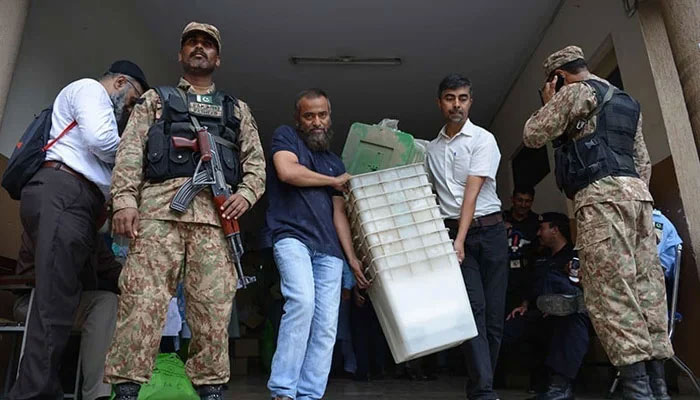Funds not released for Punjab polls
The Supreme Court had ordered federal government to provide funds to ECP by April 10 for Punjab elections
ISLAMABAD: The Rs21 billion funds for holding elections in Punjab could not be released on Monday to the Election Commission of Pakistan as per the directions of the Supreme Court. April 10 was the last day to release the funds.
However, as per the decision of the federal cabinet, the government introduced the money bill 2023 titled “Charged Sum for General Election (Provincial Assemblies of Punjab and Khyber-Pakhtunkhwa) Bill 2023” in the National Assembly.
Finance Minister Ishaq Dar introduced the money bill 2023. National Assembly Speaker Raja Pervaiz Ashraf referred the bill to the Finance Committee of the National Assembly for consideration. Dar said the government was laying the bill before the House in the light of the Supreme Court orders to release Rs21 billion to the Election Commission of Pakistan (ECP) to hold a general election in Punjab and Khyber-Pakhtunkhwa.
The finance minister said the federal cabinet, in its recent meeting, pondered over the SC orders and, in view of the House’s resolution, sought the will of Parliament to take a final decision regarding the allocation of funds for the Punjab and KP general election.
He said, “When the elected government was removed, we got a ruined economy”. He said the PTI was trying hard to make the country default. The finance minister said he cancelled his US visit in the current circumstances, on the instructions of the prime minister. He said that Pakistan was very close to signing the staff-level agreement with the International Monetary Fund (IMF), which is satisfied with the actions taken by the government to revive the loan programme.
Ishaq Dar claimed that from July 2022 till date, Pakistan had repaid $12 billion in foreign debt. “We are paying each foreign payment on time,” he added. He said Pakistan had $9.6 billion in foreign exchange reserves at present. “Pakistan reserves stand at a total of $9.60 billion — $4.10 billion available with the State Bank of Pakistan, and $5.50 billion of commercial banks,” he added. He said a strategy had been devised by the government to take the country’s foreign exchange reserves to $13 billion by June 30. He said that the government had also improved its relations with friendly countries and international partners.
Dar said the government had taken measures to stop the illegal flight of capital from the country which was showing encouraging signs. He said the government had designed a policy to end the un-targeted subsidy and provide targeted subsidies to deserving low-income people. He said that funds for the Benazir Income Support Programme (BISP) had also been increased from Rs360 billion to Rs400 billion.
The minister said elections would be held in the country as per the law and Constitution, but they should be conducted across the country on the same day under the supervision of caretaker governments. He said holding elections in the country simultaneously would decrease the total expense and ensure fairness and transparency. He said the census process was nearing completion at the cost of about Rs35 billion.
Ishaq Dar said the economic crisis left by the previous government was even more complex than that of 2013 and the 1990s. However, with the prudent policies of the incumbent government, the country had come out of a quagmire, he claimed.
Separately, the Senate on Monday passed a resolution, moved by the treasury benches, seeking the holding of the general election to all provincial assemblies and the National Assembly simultaneously ‘for strengthening the Federation’.
The resolution, which was not listed on the order of the day, was moved by National Party Senator Tahir Bizenjo during the course of proceedings of the private members day, while Pakistan Tehreek-e-Insaf (PTI) had stormed out of the House.
The setting was marred by a noisy protest by the opposition legislators. As the PTI lawmakers staged a token walkout from the House over rejection of another resolution, moved by a party member for the re-start of the PTI-led government’s Federal Ehsaas Rashan Riayat Programme, the chair asked the treasury senator to table the resolution, who readily read it out.
In the meantime, the main opposition party returned to the House only to protest against the passage of the resolution, billing it yet another attempt of the coalition government to attack the superior judiciary and undermine the apex court verdict that fixed May 14 as the fresh date for a general election to the Punjab Assembly.
Senate Chairman Sadiq Sanjrani called the resolution as passed unanimously, but later he counted one vote against it when Jamaat-e-Islami (JI) Senator Mushtaq Ahmed rose to object that he had opposed the resolution.
The resolution reads, “This House is of the opinion that, according to the spirit of Article 218 (of the Constitution), the general election to all assemblies must be held simultaneously on time under caretaker setups under Article 224 with a view to bringing true political and economic stability to the country”.
The resolution signed by lawmakers, belonging to all ruling coalition parties in the House, says that holding separate elections in Punjab, the largest federating unit having more than 50 per cent of NA seats, will inevitably influence the outcome of general elections to the seats of the Lower House of Parliament in the province: As such it will trample upon the smaller provinces role in the Federation.
As the House passed the resolution, the JI senator opposed it, saying that the draft was not shared with the opposition and cautioned that the government will face defeat if it wanted to resolve the issues in this way.
Then, he referred to the recent meeting of PPP’s Central Executive Committee that said that all the stakeholders should hold a dialogue and move forward with the dissolution of all other assemblies to hold the polls together.
Leader of the Opposition Dr Shahzad Waseem delivered a hard-hitting speech, rejected the resolution and charged, “A crime has been committed on the floor of the House whose example cannot be found in the parliamentary history, as the resolution was passed secretly in no time when PTI was on a token walkout. The people of Pakistan stand by the verdict of the Supreme Court … The election of Punjab will have to be held within the given deadline of SC.”
He made it clear that things would not get legitimacy in this way and called the move as un-parliamentary, illegal and immoral. Tearing down a copy of the agenda into pieces, he said that the treasury had stabbed in the back of the opposition and demanded that the resolution should be put to vote again.
However, the chair ruled that the House had already passed the resolution and pointed out that the PTI lawmakers were sitting in the lobby, which was part of the House and that they should have resumed their seats to take part in the voting.
He explained that 60 members voted in favour of the resolution and one against it amid noisy protests by the PTI legislators. Law Minister Senator Azam Nazeer Tarar said the opposition should take care of parliamentary traditions at least, as the resolution had been moved after the approval of nine parliamentary parties sitting in the House.
He charged, “They (PTI) are used to holding boycotts and don’t want to hear others and that the resolution has been passed in the true spirit of Article 224, which says that elections should be held throughout the country under caretaker setups. And PTI didn’t want to talk by sitting together”.
Earlier, the house rejected the PTI’s resolution, listed on the agenda, demanding that the federal government should re-start the stalled Ehsaas Rashan Riayat Programme after the Minister for Poverty Alleviation and Social Safety Shazia Marri strongly opposed it, who faced sharp criticism from the PTI senators, including Aun Abbas. He charged that the minister was in habit of giving lectures on ethics in the House, but three vehicles of Baitul Maal were being misused by her.
However, the minister alleged that the previous PTI government had not made any budgetary allocations for the programme.
The joint sitting of the Parliament, meanwhile, passed the Supreme Court (Practice and Procedure) Bill, 2023 with a majority clipping the powers of the Chief Justice of Pakistan (CJP).
The PTI senators raised high-pitched slogans, tore into shreds copies of the bill and tossed those towards the Speaker’s chair.
Prime Minister Shehbaz Sharif, flanked by Senate Chairman Sadiq Sanjrani, was also present during the passage of the bill.
The bill was previously passed by the National Assembly and the Senate and sent to the president for his nod. However, the president, while using his powers under Article 75(1) of the Constitution, returned the bill to the joint session for reconsideration.
The bill will now be sent to the president again, and under Article 75(2) of Parliament, it would become an Act of Parliament if not passed by him within 10 days.
According to an amendment to Section 5, the appeal shall lie within 30 days from the final order of a bench of the Supreme Court, exercising jurisdiction to the larger bench of the apex court and such appeal shall be filed for hearing within a period not exceeding 14 days.
The House also allowed an amendment to Clause 5, which says that an appeal shall lie within thirty days from an order of a bench of the Supreme Court, which is exercising jurisdiction under Clause (3) of Article 184 of the Constitution to a larger bench of the Supreme Court and such an appeal for hearing be fixed within a period not exceeding 14 days. Previously, the word exercised instead of exercising was used.
In the earlier draft, the word exercised was used which in the amendment was replaced with exercising. The amendment was moved by PMLN member Shiza Fatima Khawaja.
The bill proposes that every case, appeal or matter before the Supreme Court shall be heard and disposed of by a bench constituted by a committee comprising the Chief Justice of Pakistan (CJP) and two senior judges in order of seniority.
Through another amendment, which was passed by the joint session, the meeting of the committee shall be convened by the CJP or any of the two other senior judges who are its members.
It further states any matter invoking the exercise of original jurisdiction under Clause (3) of Article 184 of the Constitution shall be first placed before the committee for examination and if the committee is of the view that a question of public importance with reference to enforcement of any of the fundamental rights is involved, then it shall constitute a bench comprising not less than three judges of the apex court, which may also include the members of the committee for adjudication of the matter.
The bill recommends that an appeal shall lie within 30 days from the final order of a bench of the Supreme Court, exercising jurisdiction to the larger bench of the apex court and such appeal shall for hearing be filed within a period not exceeding 14 days. Furthermore, it grants a party the right to appoint counsel of its choice for filing a review application.
An application pleading urgency or seeking interim relief filed in a cause, appeal or matter shall be fixed for hearing within 14 days from the date of its filing.
The bill says that the right of appeal shall also be available to those persons against whom an order has been made, prior to the commencement of the Act.
Senator Mushtaq Ahmad Khan moved an amendment to delete the provision of giving retrospective effect to the right of appeal in past cases, saying it was persons specific provision. However, it was opposed by the law minister and rejected by the House.
Earlier, Law Minister Azam Nazeer, before moving the bill, took strong exception to the comments of the president, which he made while returning the bill to the joint session of Parliament. The minister said that the bill was passed by the National Assembly and the Senate and it did not suit the president to term passage of the bill as a colourful exercise of legislation.
Azam Nazeer Tarar said that the President adopts a biased approach while fulfilling his responsibility and starts facilitating his party’s interests. He further said that Parliament was fully empowered to enact laws and rules relating to the working of the Supreme Court. He said that instead of curtailing the powers of the Supreme Court, its jurisdiction has been increased while bringing openness and transparency.
He said that the rules of the Supreme Court were made during the era of a dictator in 1980 saying that Parliament was empowered to make changes to the SC rules.
Former Law Minister Farooq H Naek said that Parliament was empowered to execute such legislation. He said that it was the demand of the lawyer community that a party will have the right to appoint counsel of its choice for filing a review appeal.
-
 Jennifer Garner Reveals Why She Doesn't Like Botox And What She Gets Instead
Jennifer Garner Reveals Why She Doesn't Like Botox And What She Gets Instead -
 Instagram To Alert Parents When Teens Search Suicide Or Self-harm Terms
Instagram To Alert Parents When Teens Search Suicide Or Self-harm Terms -
 Meghan Markle Feels Kicked In The Teeth With Netflix’s Decision To Close A Door: ‘She Needs Her Family’
Meghan Markle Feels Kicked In The Teeth With Netflix’s Decision To Close A Door: ‘She Needs Her Family’ -
 World Economic Forum CEO Borge Brende Steps Down Following Jeffrey Epstein Ties Controversy
World Economic Forum CEO Borge Brende Steps Down Following Jeffrey Epstein Ties Controversy -
 Prince Harry's Ex Chelsy Davy Makes Special Announcement
Prince Harry's Ex Chelsy Davy Makes Special Announcement -
 Dominic Evans Speaks Out After Being Accused Of Being Involved In Nancy Guthrie Kidnapping
Dominic Evans Speaks Out After Being Accused Of Being Involved In Nancy Guthrie Kidnapping -
 AI Doomsday By 2028? New Study Warns Of Global Social, Economic Disruption & ‘ Intelligence Crisis’
AI Doomsday By 2028? New Study Warns Of Global Social, Economic Disruption & ‘ Intelligence Crisis’ -
 Do Sophie And Benedict Bridgerton Get Married As Netflix Show Returns For Season 4 Part 2?
Do Sophie And Benedict Bridgerton Get Married As Netflix Show Returns For Season 4 Part 2? -
 Prince William Reveals He's 'a Little Biased' Toward One Hollywood Star
Prince William Reveals He's 'a Little Biased' Toward One Hollywood Star -
 Meghan Markle, Prince Harry Visit Special Charity On Final Day Of Jordan Trip
Meghan Markle, Prince Harry Visit Special Charity On Final Day Of Jordan Trip -
 Natalie Dormer's Reaction To Sarah Ferguson's Epstein Links Resurfaces After 'The Lady' Release
Natalie Dormer's Reaction To Sarah Ferguson's Epstein Links Resurfaces After 'The Lady' Release -
 Did You Know Famous Windows 10 Background Was Shot In Real Life? Here's Story
Did You Know Famous Windows 10 Background Was Shot In Real Life? Here's Story -
 Pete Davidson's Baby Mommy Elsie Hewitt Reveals Why She 'hated' Being Pregnant
Pete Davidson's Baby Mommy Elsie Hewitt Reveals Why She 'hated' Being Pregnant -
 Harry, Meghan Show Royal Family How To Make Impact Without Public Money
Harry, Meghan Show Royal Family How To Make Impact Without Public Money -
 Hillary Clinton Set For Deposition Before House Committee Today In Jeffrey Epstein Investigation Case
Hillary Clinton Set For Deposition Before House Committee Today In Jeffrey Epstein Investigation Case -
 Samsung Galaxy S26 Ultra Debutes With Display That Blocks Side Viewers
Samsung Galaxy S26 Ultra Debutes With Display That Blocks Side Viewers




